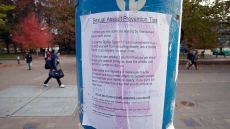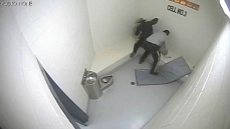EDMONTON — Alberta is making a life-saving drug available without a prescription to curb fentanyl overdose deaths.
The government says it is making naloxone easier to get as an antidote to the powerful synthetic opioid, which has been linked to 69 deaths in the province this year and 274 in 2015.
"Too many lives have been cut short by fentanyl and too many have lost loved ones," Brandy Payne, associate minister of health said Wednesday.
"Our hope is that removing the prescription requirement will encourage more people to access these potentially life-saving kits."
Naloxone works by blocking the effects of fentanyl such as extreme drowsiness or loss of consciousness before a person overdoses, giving them time to seek medical help.
Earlier this year Health Canada cleared the way, following a scientific review, for provinces to make naloxone available without a prescription.
The injectable antidote can already be obtained at some Alberta pharmacies for free and at community health clinics.
Payne said about 600 of Alberta's 1,100 pharmacies are taking part in the program so far, which includes training for pharmacists on how to teach people to safely use it.

Fentanyl is about 100 times stronger than morphine. The drug, produced offshore, can be deadly because people often don't know if it has been cut into street drugs such as fake oxycodone or heroin.
Payne said Alberta will also bolster drug counselling services and expand access to programs designed to wean people off of opioids.
The province already allows paramedics to distribute naloxone and emergency medical technicians and emergency medical responders to administer and distribute the drug.
Naloxone has been available in British Columbia without a prescription since March.
The College of Pharmacists of B.C. has said it is essential that anyone administering naloxone call 911 immediately. The regulator also warns that the effects of naloxone wears off after 30-75 minutes, which means an overdose can return.
Last month B.C.'s provincial health officer declared a public health emergency due to a dramatic increase in the number of overdose deaths. The province was projecting up to 800 fentanyl-related deaths this year.
Payne said it is not necessary for Alberta to declare a similar emergency to deal with the situation.

She said the province has a supply of 9,000 naloxone kits and plans to bolster treatment services in southern Alberta to help communities hard hit by fentanyl, including the Blood Tribe reserve.





